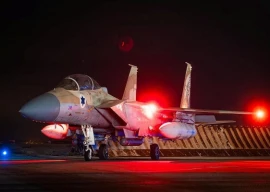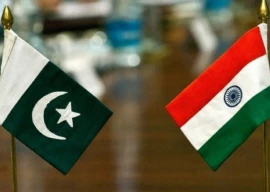
PESHAWAR:
Among the young, poetry usually revolves around romance. In Pakistan’s tribal areas, the situation is different; poetry is deeply imbedded within the locals, who yearn for peace, unity, and cooperation.
One such poet from the area is Gul Nazir Mangal. Mangal belongs to Kurram Agency in the Trimangal area. The security situation in his home town has remained volatile since the Soviet Union invaded Afghanistan. Currently, the situation in the agency has been so turbulent, that he and his family have been forced to relocate.
In an interview with The Express Tribune, he speaks extensively about his earliest memory of experiencing poems during the war, what influenced him to become a writer, his aspirations, and a wide range of poets who have influenced him.
Mangal says that the current political and security situation motivated him to write poetry, since his academic background is not associated with art or literature. He adds that no one in his family is educated. “Music and poetry is a frame of mind possessed by people,” he says. “The mind is shaped by our environment; we have nothing but arms, ammunition and continuous wars in our environment.”
Mangal’s verses reflect his passion for his homeland. He believes that the war has crept into every aspect of their social lives and has become a part of their culture and literature.
“Where I live, people are languishing in extreme poverty and are even deprived of basic rights,” says Mangal. He adds that the war has serious impacts on the economy, which further drives him to write and raise his voice for the rights of his community.
“I have made poetry a means to let the world know about our miseries,” he tells The Express Tribune. Mangal has also penned scores of songs by famous Pashto singers like Naghma Jan, Wagma, Rais Bacha and Nazia Iqbal.

He feels that current musicians in Peshawar are not aware of their responsibility towards society and produce music that is not only against tradition but it also portrays a negative image of Pakhtun society. He says that there was once a time when artists would look for good lyrics, and their search would continue for days until they found something worthwhile. But today, he feels there are a number of unknown lyricists who have completely destroyed music and culture. “Music is the identity of any society; in such a catastrophe,we cannot preserve our cultural identity,” he says.
Aside from the war, women in Pakhtun society have also had an impact on his work. He believes that women in his area have no access to education and other basic fundamental rights.
Gul Nazir Mangal has published his poetry book Da Speen Ghar Badoona. His next book, which will include both poetry and prose, will be published by the end of this year. The main focus of his next book would be women in the tribal areas. “The women in our area are facing harsh conditions. They are the worst affected by the on-going war on terror,” he adds. “I know the book cannot break the ice but I will endeavour to provide them their rights.”
Published in The Express Tribune, November 30th, 2012.
Like Life & Style on Facebook and follow at @ETLifeandStyle for the latest in fashion, gossip, entertainment
COMMENTS (2)
Comments are moderated and generally will be posted if they are on-topic and not abusive.
For more information, please see our Comments FAQ
















































Of course,